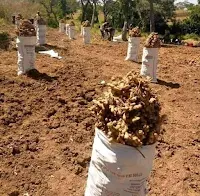
Ginger farming in Nigeria is a lucrative business opportunity that is often overlooked. It's a spice that has been used for centuries for its medicinal properties, and Nigeria is one of the largest ginger producers in the world. With the right knowledge and resources, starting ginger farming in Nigeria can be a profitable venture. However, like any other agricultural business, challenges and risks are involved.
In this post, we will guide you on how to start ginger farming in Nigeria. From land preparation, planting, harvesting, and marketing, we will cover all the essential steps that you need to take to ensure profitable ginger production.
How to Start Ginger Farming in Nigeria
Starting ginger farming in Nigeria is a great way to create wealth and provide for your family. You must secure land, a water source, and equipment to start.
The first step is to find suitable land for cultivation. Ideally, it should be located close to a major city or town as this will make it easier to access markets and buyers.
Once you have identified a suitable location, it's time to start preparing your land. This involves clearing the area of any existing vegetation and leveling the ground. You may also need to add compost or fertilizer to the soil to provide nutrients for the ginger plants.
Plow the soils thoroughly until they are soft and crumbly, ensuring easier crop harvesting and making it easier to cultivate the land. After this, construct beds 15 cm high, 1 meter broad, and convenient in length with at least 50 cm between beds. For irrigated farming which helps reduce water wastage, 40-centimeter-wide ridges would be suitable.
Also, it is beneficial to add pasteurized animal manure or compost manure to enhance soil fertility further and provide a nutritious base for growth. Careful consideration must be given when choosing an appropriate garden spot since growth depends on soil quality and drainage capacity. If done correctly, these necessary steps will put you on the path to producing successful ginger crops within a few months.
How Long Does It Take to Grow Ginger in Nigeria?

The time it takes for ginger to mature and be ready for harvest is determined by various factors, including the kind of ginger, soil conditions, and climate.
Ginger takes around 8 to 10 months to develop and prepare for harvest in Nigeria. Normally, it is planted in Nigeria between April and May, with harvest beginning in December. However, the timing may vary depending on the precise location and climatic factors.
It is critical to ensure that the soil is rich, well-drained, and capable of retaining water. Also, ginger grows best in a warm, humid area with temperatures ranging from 20°C to 30°C and regular rainfall or irrigation. Further, weeding, mulching, and fertilizing, among other things, can assist in boosting ginger growth and ensure a plentiful crop.
How Profitable is Ginger Farming in Nigeria?
Ginger is undoubtedly an amazing and versatile superfood with a myriad of uses in both culinary and medicinal applications. As such, ginger cultivation has become very profitable for many farmers worldwide, not just in Nigeria. In recent years, rising demand from international markets has significantly increased the price of ginger on a global level.
Production in Nigeria alone tripled in 2018 due to larger investments from the public and private sectors. On average, farmers that plant ginger can make more than 300% profit margins compared to traditional crops like soybeans or yam.
Moreover, the high market value further encourages investments in research initiatives to improve production efficiency and quality control standards through advanced commercial technologies.
Where is the Best Place to Farm Ginger in Nigeria?
Although ginger may be cultivated throughout Nigeria, the optimal location for ginger farming will vary depending on the soil type, temperature, and water availability. Generally, ginger grows best on soils with good drainage, a high organic matter content, and a pH between 5.5 and 6.5.
Based on these factors, some of Nigeria's best places to farm ginger include Kaduna, Bauchi, Gombe, Adamawa, and Kano.
Which Season is Best to Plant Ginger in Nigeria?
The rainy season in Nigeria typically starts in March and lasts through to April, making these months prime time for planting ginger. The cool, moist soil and ample rainfall needed to bring out the best of ginger favor a climate like this one, making this the ideal period for growing it. Also, ginger can be planted from seeds and rhizomes, giving you multiple planting avenues.
Planting from seed will take some patience, as sprouts won’t appear until about 8 weeks later. But you will likely succeed more with larger plants if given enough time, so the shortened wet season is the better option.
A significant aspect of planting ginger during the rainy season is that there will be less chance of some common pests attacking your crop. These insects can be destructive if left unchecked, greatly reducing yields and crop quality.
Ginger Producing States in Nigeria
1. Kaduna

Kaduna state is particularly renowned for its production of ginger, and it is currently the largest producer of this spice in Nigeria. The farmers are highly successful in growing cash crops like ginger due to the soil’s fertility, the climate’s suitability, and ample rainfall. Also, it supplies large quantities of ginger to local markets and exports it throughout the country.
2. Bauchi

Bauchi is another major ginger-producing region in Nigeria, with many farmers cultivating the crop to make a living. The region is well-known for its high-quality ginger, exported all over Nigeria and abroad. It also has an ideal climate for growing the spice as it has warm temperatures, plenty of rainfall, and rich soil that provides plenty of nutrients.
3. Gombe
Gombe is a relatively small state in Nigeria but is still a major ginger-producing region. The region's climate is very suitable for growing ginger as there is ample rainfall and warm temperatures throughout the year. As a result, many farmers use ginger to make a living in the area, supplying local markets and international exporters.
Conclusion
We hope this article helped give you the information you need to start your ginger-farming business in Nigeria. The areas highlighted above are some of the best places for ginger production, but remember that the optimal location will be determined by soil type, temperature, and water availability.
 Sodiq J.
Sodiq J.
